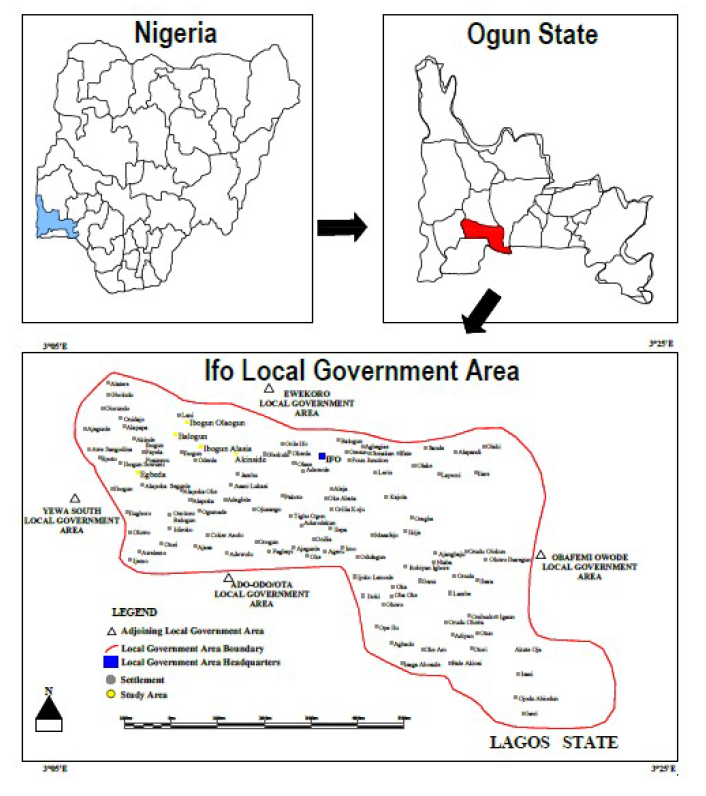An evaluation of rural electrification in Nigeria: A study of Ibogun community, Ogun state
Main Article Content
Abstract
Rural electrification (RE) has not been effectively pursued especially due to huge financial implications in the RE infrastructure provision. Because of the privatisation of the electricity distribution in Nigeria and the compartmentalization of distributors to regional areas, it is expected that rural communities, which are composite part of the region, should be incorporated in the overall framework for RE. But since the deregulation of the electricity sector, little or no attempt has been made to evaluate the current situation of RE of many Nigerian communities. This study evaluated RE in Nigeria, however, using Ibogun community as its case study. This study adopted a cross-sectional survey approach. Multistage sampling technique was adopted to distribute 122 copies of questionnaire across 10 villages. Findings revealed that Ibogun community is a literate society dominated by the low-income class. 26% of its residents relied on the electricity service provider (ESP) for electricity supply whereas 69.7% received electricity supply from both ESP and alternatives, particularly power- enerating sets. Because of the inadequate electricity supply, about 46% of residents used power-generating set between 1 to 4 hours daily to augment shortage. Most residents received estimated electricity bills, which indicate electricity consumption in the community is not metered. 42.6% confirmed electricity infrastructure was in a poor state and 50% rated electricity supply as poor. About 70% of the residents were affected by poor electricity supply but the greatest negative impacts were imposed on residents’ businesses and communication. The major problem of electricity supply was the climate impacts on electricity infrastructure. Although residents perceive government role in electricity supply as marginal, nonetheless the residents considered as priority intervention, the upgrade of existing electricity facilities by the government. And to cope with various challenges of electricity supply and its associated impacts, Ibogun community has adopted self-help approaches toward improving electricity supply through the acquisition of electricity transformers and poles and execution of repairs of electricity transformers and poles when necessary. The inferential statistic (Spearman’s Rank Correlation) results indicated that there is no significant association between income and variables (source of electricity, alternative source of energy supply, and daily hourly usage of a power-generating set). The study makes recommendations towards solving the challenges of rural electrification.
Article Details
References
S. O. Oyedepo, Energy and sustainable development in Nigeria: The way forward, Energy, Sustainability and Society 2(15) (2012) 1-17.
O. G. Olasunkanmi, O.A. Roleola, P.O. Alao, O. Oyedeji, F. Onaifo, Hybridization energy systems for a rural area in Nigeria, IOP Conf. Ser.: Earth Environ. Sci., 2019, 331 012007.
B. Ngwenya, Stakeholders perception of socio-economic benefits of rural electrification programme in Zimbabwe: A case of Umzingwane district, American Journal of Rural Development 1(3) (2013) 33-39.
R. Jimenez, Development e ects of rural electrification, (IDB Policy Brief; 261) Infrastructure and Energy Sector Energy Division, Policy Brief No IDB-PB-261, https://publications.iadb.org/publications/english/document/Development-Effectsof-Rural-Electrification.pdf
R. Kareithi, G. Muhua, Factors influencing implementation of rural electrification programme in Kenya: A case of Kieni East sub county, Nyeri county, European Scientific Journal 14(21) (2018) 236-247.
A. Groth, Socio-economic impacts of rural electrification in Tanzania, International Journal of Sustainable Energy Planning and Management, 21 (2019) 76-92.
[C. C. Uzoma, K. C. Amadi, Energy access: A key to rural development in Nigeria, Journal of Social Science 5(1) (2019) 452-456.
F. O. Akpojedje, M. E. Onogbotsere, E. C. Mormah, P. E. Onogbostere, A comprehensive review of Nigeria electric power transmission issues and rural electrification challenges, International Journal of Engineering Trends and Technology 31(1) (2016) 1-9.
S. Ohiare, Expanding electricity access to all in Nigeria: a spatial planning and cost analysis, Energy, Sustainability and Society 5(8) (2015) 1-18.
K. Olaniyan, B. C. McLellan, S. Ogata, T. Tezuka, Estimating residential electricity consumption in Nigeria to support energy transitions, Sustainability 10 (2018) 1440.
M. Torero, The impact of rural electrification: challenges and ways forward, Revue D’economie du Developpement 23 (2015) 49-75.
B. Badejo, O. Olasunkanmi, N. Ogunseye, Investigating electricity consumption in Ogun state, Nigeria, Journal of Engineering Studies and Research 26(1) (2020) 7-16.
A. A. Popoola, H. H. Magidimisha, Rural energy conditions in Oyo state: present and future perspectives on the untapped resources, International Journal of Energy Economics and Policy 9(5) (2019) 419-432.
Ogun - INEC Nigeria, http://www.inecnigeria.org
Ogun State Government, Ogun state regional plan (2005-2025) final report, Lagos: CPMS Limited, 2008.
World Bank, Monitoring and evaluation in rural electrification projects: A demand-oriented approach. Washington DC: The World Bank, 2003.
R. Kumar, Research methodology: A step-by-step guide for beginners. London: SAGE Publications Ltd., 2011.


